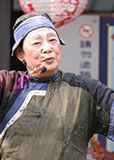
楊秀衡(1939生),客家音樂家。出生於高雄美濃,1947年開始跟隨來丁師學習太祖拳,1952年,楊秀衡加入華美歌劇團,一開始學習武生,加入戲班兩年後即演出探花、小生等角。1963年,他組了撮把戲團,巡迴於各地演出,開始了其行走生涯。1970年代,由於電視的出現,野臺戲日趨沒落,因此他成立了楊家國術館與豪記綜藝團,在喜慶場演出,因應時代也在表演中演唱流行歌曲。1986年,被許常惠發掘,於各大藝文活動演出。1998年,楊秀衡更獲得高雄縣政府優良民間藝人的肯定。2003-2006年,於各地教學及交流,將客家文化發揚光大。他的音樂風格,配合戲劇、舞蹈、雜耍、魔術與功夫等不同表演形式而形成的撮把戲,可說是民間藝術之即興扮演的最佳範本,更為逐漸消逝的傳統民間藝術留下歷史的見證。
YANG Xiu-Heng was born in Meinong, Kaohsiung in 1939. Nicknamed “the walking Hakka music dictionary,” he was the last person in Taiwan still able to perform a particular style of Hakka music called “Chhot Pà Hi.” Although he was Hakka, he studied mostly Minnan (Hoklo) gezaixi (Taiwanese opera) music, which is why he fused Minnan gezaixi music with the Hakka “Chhot Pà Hi” music. He established Yang’s National Arts School and the Hao Ji Assorted Arts Troupe, performing at weddings and celebrations for people moving into new houses. He was awarded the Kaohsiung County Government Superior Folk Artist Award.
